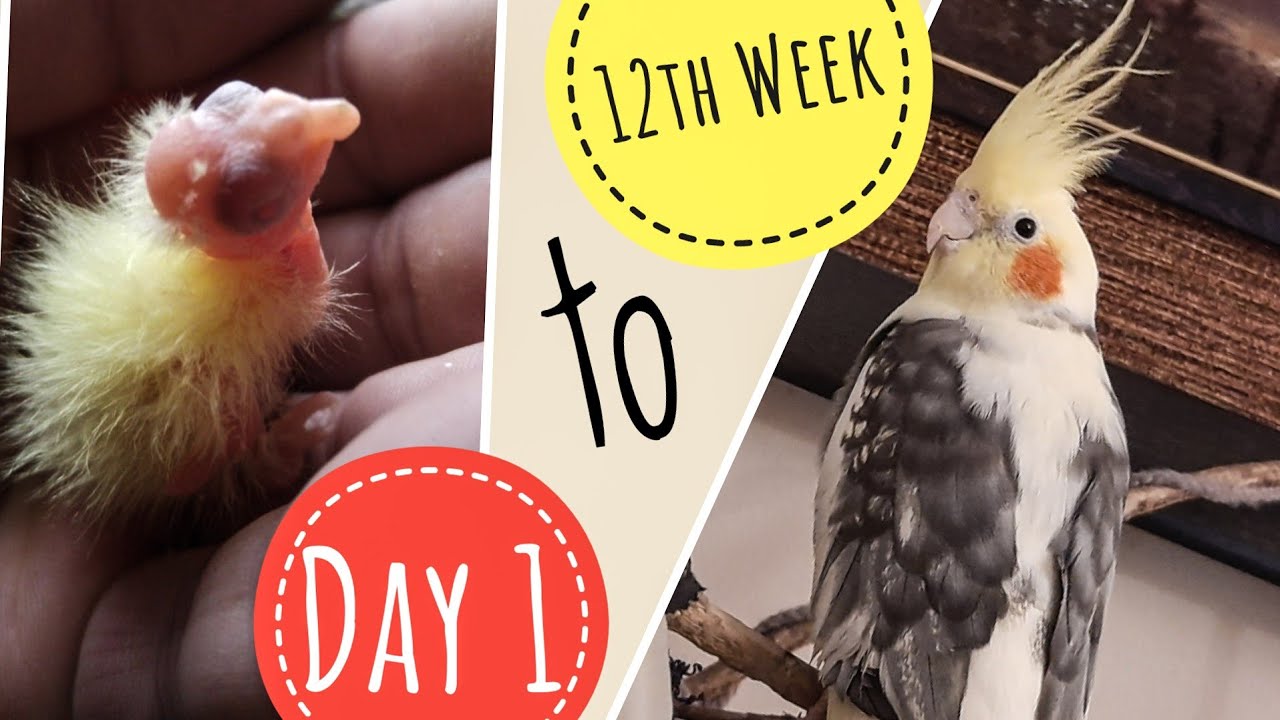Cockatiel Growth Stages
Hatching and Nestling Stage
In this early stage, baby cockatiels get their start in the world. Here’s what happens in those first crucial days:
- Day 0: The wee chicks hatch, though not all at once, leaving some brothers and sisters a little older than the others.
- Day 3: Their tiny eyes start to take a peek at the world around them (Feisty Feathers).
- Day 5: By now, most eggs that are going to hatch have done so, and the ones that won’t are easy to spot—they’re a tad darker.
- Day 6: Their feather lines become more apparent, and they might start acting a bit edgy, like hissing or moving about if they feel a little unsettled (Feisty Feathers). Sometimes, a late hatcher may surprise you, leading to some curiosity around the nest.
Here’s a snap view of the first few days:
| Day | Developmental Milestone |
|---|---|
| 0 | Eggs hatch |
| 3 | Eyes begin to open |
| 5 | Most of the eggs hatch |
| 6 | Feather tracts evident, defensive behaviors begin |
Got your hands full with newborn chicks? You’ll find more on care in our cockatiel egg hatching article.
Fledgling Stage
Now’s when things get interesting—our cockatiel chicks are spreading their wings, almost literally:
- Weeks 3-4: They start to grow the feathers that’ll serve them in flight, testing their wings inside their cozy nest.
- Week 5: Ready or not, they’re poking their heads out, practicing little flights, and keeping a keen eye on the world. Watch them closely so they don’t wander too far.
- Week 6: They’re getting stronger, flying more adventurously, and cultivating a healthy curiosity about all things around them.
- Month 2: By now, they’re pretty nimble in the air and acting more like grown-up birds—starting to feed themselves and explore their surroundings independently.
The fledgling journey summed up:
| Week | Developmental Milestone |
|---|---|
| 3-4 | Flight feathers grow, more active in the nest |
| 5 | First flying attempts, exploring beyond the nest |
| 6 | Better flying, increased curiosity |
| 8 | Proficient flying, begins self-feeding |
Keeping these stages in mind can help ensure your bird develops well. Curious about their smarts or how to manage their weight? Check out our reads on cockatiel weight and cockatiel intelligence.
Developmental Milestones
Understanding the growth journey of cockatiels can make a world of difference in how owners care for them. They go through the Juvenile Stage and the Adult Stage, each with traits that set them apart.
Juvenile Stage
The Juvenile Stage kicks off when a cockatiel has all its feathers, typically around 6 to 8 weeks old. At this point, they start acting like teenagers, pushing limits and exploring their space (Birds Details Reminder).
A closer look at the Juvenile Stage:
- Age Range: 6 weeks to 6 months
- Size: Usually 9 to 12 inches from nose to tail
- Feather Development: They sport their full juvenile feathers with occasional shedding as they get their adult feathers
- Behavior: Expect a curious, playful demeanor as they try out whistles and mimic sounds, testing their vocal cords
- Diet: They munch on a healthy blend of seeds, pellets, and fresh fruits and veggies (Can They Eat Blueberries?, How About Carrots?)
Adult Stage
Around 6 months, cockatiels enter the Adult Stage. This is where they hit physical maturity, and growth levels out. This is when their personalities shine, and they often form strong bonds with their owners.
What to expect in the Adult Stage:
- Age Range: 6 months and beyond
- Size: Grows to about 12 to 14 inches from head to tail (Size Info from Cockatiel World)
- Sexual Maturity: They develop distinct gender traits, making it easier to tell males from females (Sexing Tips on Quora)
- Behavior: More predictable routines and interactions
- Diet: Needs a nutritious mix of seeds, pellets, and fresh produce
| Age Range | Size (in inches) | Feather Development | Diet |
|---|---|---|---|
| 6 weeks to 6 months | 9 to 12 | Juvenile feathers, some shedding | Seeds, pellets, fruits, veggies |
| 6 months and older | 12 to 14 | Adult plumage | Balanced seeds, pellets, fresh foods |
To make sure your bird thrives in the Adult Stage, get regular vet visits, offer a nourishing diet, and keep their environment fun and challenging. Older birds might appreciate soft bedding and a quieter space, which can boost their happiness (More at Birds Details).
Check out more about cockatiel stages and dive into fun facts like cockatiel dancing, how smart they are, and their mating habits in our collection of articles.

